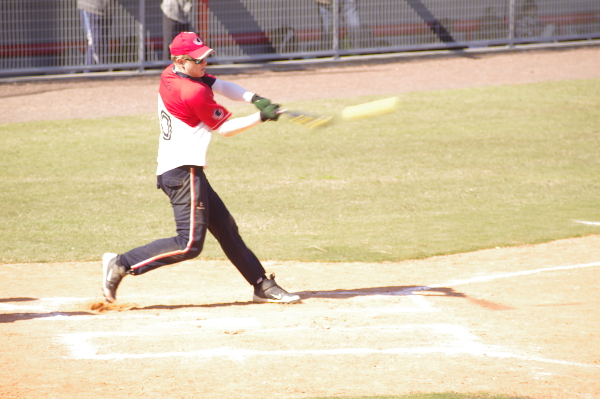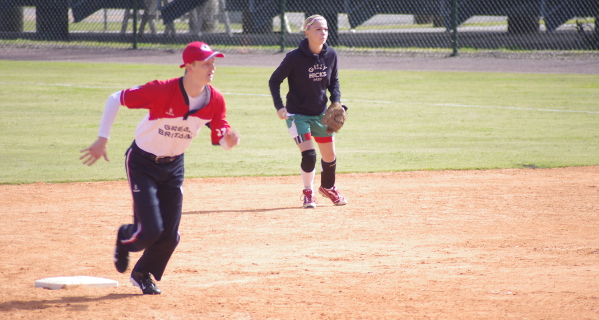 By Bob Fromer
By Bob Fromer
The opinions in this article, except where others are quoted, are those of the author. And -- don't miss a photo gallery from the tournament at the end of the story.
The third ISF Co-ed Slowpitch World Cup, played in Plant City, Florida from 23-26 January after a nine-year gap, featured eight teams from seven countries and was regarded with enthusiasm by both the competing teams and the International Softball Federation, who have pledged to run it as an annual event and to grow the tournament over time.
While the shape of the competition in future is still uncertain and will need to be the subject of discussions between the ISF, the countries that took part and countries that might be interested in attending, the ISF's desire to run the competition annually will be welcomed by all those who took part.

GB reactions
For the GB Slowpitch Team, who finished second, the event provided valuable competition experience for many of its Development Squad players, who made up the bulk of the travelling team, and all the players who went found the experience hugely rewarding.
One of the newcomers to the team, outfielder Chloe Llewellyn, said: “I personally felt that the whole trip was an excellent experience from start to finish. I was surprised with how close both the management and players became over a short space of time and how supportive we all were for each other to do well.... As a relative newcomer to softball my aim was to learn as much about the game as I could. The encouragement, support and knowledge I gained from the senior players has gone a long way to speeding up my own game play and for that I am grateful.... If the opportunity ever presented itself again I would love to represent GB and bring home the gold.”
One of the senior players on the team, first base player Emily Clifford, said: “Attending the 2014 Slowpitch World Cup was such a special opportunity for the GB players who were selected to go. The way the team bonded leading up to and during the tournament was one of the best I've seen. The icing on the cake was Saturday 25 January. I will forever enjoy looking back at the two playoff games verses USA Fort Walton Beach and USA Ink Daddyz with a warm sense of pride and excitement! There's nothing better than playing good teams, on real diamonds, under floodlights, in close battles and coming out on top!”
Outfielder Areej Emaazi said: “Going over to Florida to play in the World Cup was always going to be an amazing experience, as the Americans do softball better than anyone else.... Playing internationally adds an extra level of stress to the game and I feel it's easy to spot the more seasoned players from the rest of us, but each tournament adds a new level of experience..... Although our last game was disappointing … I think we all came away feeling we'd learned a lot about how other teams successfully play the game, and about how to develop our own training for the future.”
Team captain Lucy Binding said: “As captain I was so proud of the team's achievements and as a player it was an absolute honour to be part of this World Cup squad. We were there to represent Great Britain at the World Cup and I feel every single player and coach can hold their heads up high.... I feel that the ISF World Cup was a massive success for the organisers but also for GB Softball. There was some awesome softball being played on the best diamonds I’ve ever played on. It was organised really well and it looked like all eight teams thoroughly enjoyed themselves. I hope the success of the tournament means that the World Cup will be held on a regular basis.”
Finally, GB pitcher David Lee was quick to assign credit for a successful trip: “The GB Slowpitch team performance [in Florida] is a testament to the skill, determination, and courage of all the players involved, but even more so to the outstanding coaching team led by Steve Patterson. Steve's passion and belief inspired a team made up mainly from the Development Squad to perform way above their own expectations and justify their selection. After a tour whose success was founded on team ethics and building a strong bond amongst a team of relative strangers, if any individual deserves extra praise, it's Steve Patterson.”
A step forward
In many ways, the 2014 Slowpitch World Cup – the other two were held in 2002 and 2005, also at the ISF headquarters complex in Plant City – marked a significant step forward. A record number of seven countries took part, and there were first-time entries by teams from Canada, Bulgaria, Curacao, France and the Turks & Caicos Islands.
ISF CEO and former President Don Porter said: "This event definitely underlines the growing value, visibility and passion that softball athletes around the world have for representing their countries on the international stage.
“This mixed World Cup reinforces the power of sport to encourage and inspire gender equity, teamwork, cooperation, mutual respect, friendship, education and social change,” Porter added, “and I am particularly proud that softball is being used as such a vehicle across both genders and across all ages in a growing number of countries.”
Variable standard
However, the overall standard of teams at the 2014 World Cup was lower than the last time the event was run.
While the two American entries and the GB Slowpitch Team were at an equivalent level, the other five entries were of a lower standard, and when these teams met GB or the Americans, a mercy-rule scoreline was often the result.
In 2005, when the competition also had two American teams plus GB, Ireland, The Clan from Scotland (who won the event) and stronger teams from the Caribbean, the overall standard was higher.
Nonetheless, the ISF is now very keen for this tournament to continue and Laurie Gouthro, ISF Director of Competitions, has pledged to make it an annual event and to build up the number of entries year on year.
An ISF press release after the tournament said: “The successful delivery and athlete experience at the 2014 Co-Ed Slowpitch Softball World Cup, in addition to the accessibility and ease for new athletes to learn and be introduced to a discipline such as slowpitch softball, has boosted the event's future prospects. The positive outcome in Plant City and the growing international interest from both National Federations and clubs has led to the affirmative decision that the event will be organised and celebrated annually, leaving a lasting legacy for the 2014 slowpitch event and host.”

Questions
But some challenges remain, and the main ones are:
- How can other countries and clubs be attracted to the event?
- How can the overall quality of the competition be raised?
- Is an annual event the optimum format?
From a British point of view, one answer to the cost issues that could be raised by an annual event would be to alternate sending the GB Slowpitch Team and a leading club team to the tournament, an option that the BSF is keen to explore.
Pressure from the British Softball Federation was a key factor in the ISF creating a Slowpitch World Cup in the first place, and in bringing back the event in 2014 after the nine-year gap. For the BSF, the motivation for wanting a high-level world slowpitch competition is in part because the GB Slowpitch Team, winner of all nine European Championships played since the competition began in 1998, currently struggles to find challenging opposition in Europe.
Also, as a majority-slowpitch country (one of the few in the world), it's in our interest to encourage wider international competition in the slowpitch format.
And while the GB Team could, if it wished, enter any one of a number of high-level domestic slowpitch tournaments held annually in the US or Canada and get higher-level competition than the recent World Cup provided, none of these events would carry the cachet of a genuine world tournament organised by the sport's International Federation -- a tournament that the GB players clearly enjoyed.
So it is very much in GB's interests that the Slowpitch World Cup continues, and that it grows stronger.
What can be done?
One way to raise the overall level of the tournament might be to encourage those countries that have entered, or sanctioned club teams to enter, to see the tournament as a high-level international competition and to send stronger teams.
At this point, the competition features more club teams than national teams, and perhaps countries such as Canada, where slowpitch is undoubtedly strong, could look to promote the tournament to club teams that have won domestic competitions.
The captain of the team from Curacao said that, not knowing what the standard would be, they decided to send a low-level team to “have fun”. “If we wanted to,” he added, “we could have sent a team that would win the tournament.” Regardless of whether that's true, Curacao, which produces a steady stream of Major League Baseball stars, is doubtless capable of sending a better team than they did.
There has also been some talk of Europe (excluding GB) sending an All-Star team to the event, and if that could be done, it would certainly raise the standard. And while it would have been good to see teams from Slovenia, Ireland or Germany in Plant City (all of which appeared possible at some point during the past few months), Europe, with three of the eight teams that turned up for the event, is already doing its bit.
So another key element is to interest those countries or territories beyond Europe and North America where a lot of slowpitch appears to be played, such as the Philippines, Chinese Taipei, Singapore, Korea, Hong Kong, Dubai, Mexico and a number of other Caribbean and Latin American countries.
The BSF helped the ISF to create its publicity for this year's World Slowpitch Cup, and will be happy to do so again. But it's excellent news that the ISF has pledged to put its prestige and influence behind the event to help it develop in future.
Looking ahead
The BSF is already talking to the GB Slowpitch Team management and players to see what their feelings were about the event and the BSF will no doubt continue a dialogue with the ISF and others about the future of the competition.
It will be very good if the momentum generated in Plant City can be built on, and the Slowpitch World Cup can become a fixture on the world softball calendar. But for it to become a truly meaningful event, both the quality and quantity of teams will need to be raised over time.
